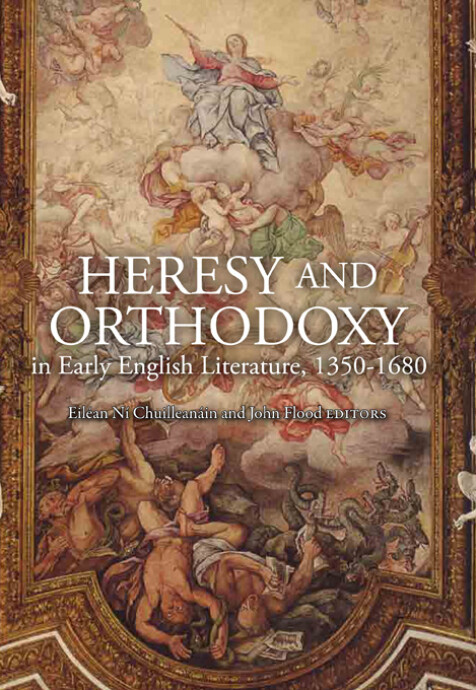Heresy and orthodoxy in early English literature, 1350–1680
Eiléan Ní Chuilleanáin & John Flood, editors
‘[The collection is] edited and admirably introduced by Ní Chuilleanáin and Flood … one of the best papers in the collection is Amanda Piesse’s “Hidden heresies in Jacke Jugeler” … Ní Chuilleanáin’s [essay on Milton and the scandal of divorce] is a dense, meticulously argued paper, well worth the read … [this] is a sound, if somewhat eclectic, grouping of articles all concerned with the changing face of heterodoxy over a span of three centuries and the general consistency, if not the identity, of the hostile orthodox reaction toward it, Donne perhaps excepted. The eight micro studies of figures both famous and relatively unknown, of fiction and non-fiction alike, are a worthy addition to the literature on dissent. There is something here for most everyone interested in the subject’, Rosanne Gasse, Fifteenth-century journal (2013).
‘Offer[s] significant contributions to reconsiderations of early English religious cultures … engages head-on the doctrinal boundaries of heresy and orthodoxy … deepen[s] our understanding of just how complex the relationship may be between cultural changes and continuity and between orthodoxy and heterodoxy … the volumes offers a special focus on the various social dimensions of heresy in late medieval and Early Modern England’, Shannon Gayk, Journal of English and Germanic Philology (October 2013).
'This current volume takes it place in a new series – Dublin Studies in Medieval and Renaissance Literature – which seeks “to address significant aspects” of the literature of the period in research by both “younger scholars” and “established academics”. Heresy and Orthodoxy in Early English Literature, 1350–1680 holds true to these ambitions … [there is] stimulating, potential, and intellectual endeavour on display in [this] fine work', Thomas Charlton, Renaissance Studies (September 2011).
‘This collection of eight essays contributes valuably to scholarship on the relation of heresy to orthodoxy from the late Middle Ages to the early modern period. One advantage of this book is its wide chronological range … this is a strong and rewarding collection of essays … the volume includes valuable discussions of the changing concept and literary uses of heresy from the fourteenth to the seventeenth centuries. As such, it makes a notable contribution to work on writing and religion in late medieval and early modern England', David Loewenstein, Journal of British Studies (April 2012).

